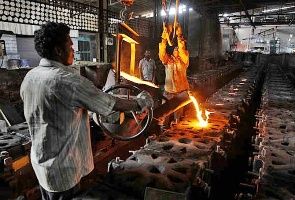 Prime Minister Narendra Modi's 'Make in India' plan should give priority to the big domestic market that is ready to spend, OECD chief economist Catherine L Mann said on Thursday.
Prime Minister Narendra Modi's 'Make in India' plan should give priority to the big domestic market that is ready to spend, OECD chief economist Catherine L Mann said on Thursday.
Her remark is in consonance with Reserve Bank of India Governor Raghuram Rajan's comment in December 2014 on Make in India campaign that India should focus on domestic demand.
The OECD economist commenting on the Prime Minister's ambitious manufacturing plan said, "Make in India is divided into two aspects.
"One is 'Make in India' for world and the other 'Make in India' for India.
"The country is already having a large domestic market which is ready to spend. Manufacturers also know what Indians want.
Thus, in my view, 'Make in India for India' should be the priority," she said.
Earlier in December, Rajan had said: "I am counseling against an export led strategy that involves subsidizing exporters with cheap inputs as well as an undervalued exchange rate, simply because it is unlikely to be as effective at this juncture."
India should also focus on domestic demand and create a unified market with a view to reduce transactions cost, he had said.
Mann was in the city to share her views about a recent survey on Indian economy conducted by OECD.
Budget 2015: Complete Coverage
During a media interaction at IIM here, Mann said implementation of policies remains a concern in India, which is making industry impatient despite the new government's several pro-industry announcements in the nine months.
"Even if the legislation is passed, implementation still remains a challenge in India. However, there are some states which have successfully implemented these policies. Such states can serve as a guiding force for the Centre" she said.
Asked about her views about country's current economic status after the new government took over, Mann said the Indian economic scenario as well as the challenges are same as they were in the past.
"There has been insufficient investment over last decade across the world. Private sector as well as governments are not investing in long term projects. India is the same as other countries, since there is not enough public or private investment coming in," she added.
Mann pointed out that acquiring land, complex tax regime and labour laws, difficulty in working across state boundaries remains some conventional challenges in India.
"The new government is putting all the efforts on how to break through some of these challenges.
“But, we have to see how far the government will be successful in doing so" she said.
Image: Workers tend to a furnace at a steel factory. Photograph: Babu/Reuters









